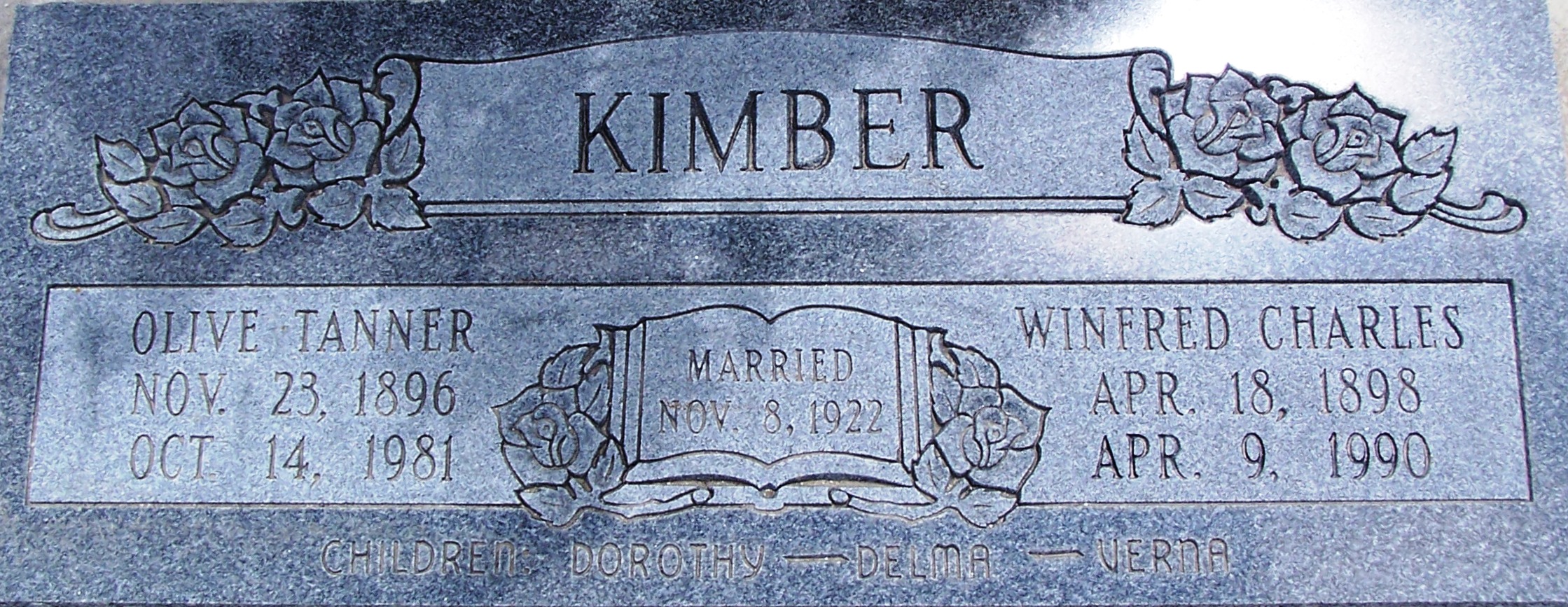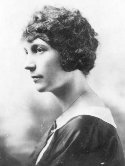 I, Olive Tanner Kimber, was born on November 23, 1896 at West Grouse Creek, Utah. This place was later called Etna, when a post office was established there. There were about eleven families living there. It was a ranching country and was surrounded with hills and mountains where the cattle and horses were ranged. The home was situated in a valley known as Death Valley, so named because of a man being found dead many miles above the ranch along the stream that supplied water to irrigate the meadow and grain fields.
I, Olive Tanner Kimber, was born on November 23, 1896 at West Grouse Creek, Utah. This place was later called Etna, when a post office was established there. There were about eleven families living there. It was a ranching country and was surrounded with hills and mountains where the cattle and horses were ranged. The home was situated in a valley known as Death Valley, so named because of a man being found dead many miles above the ranch along the stream that supplied water to irrigate the meadow and grain fields.
When I was born Mrs. Blanthorn, the local midwife, was in attendance. I was a chubby twelve pound baby, with dark brown hair and hazel eyes. My father and mother were very happy because I was a girl.
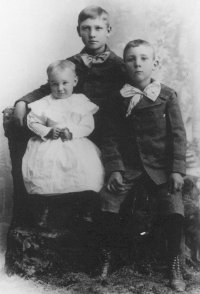
Olive, Ralph & Valison Tanner Jr
When I was a small baby my mother went to visit one of our neighbors. My father left her at the gate and returned home. The children living there all had colds. She tried to keep the children away from me, but as children do–they would stand close to look at the baby. In a short time I had bronchial pneumonia and I became so sick I was dying. My parents were frightened and sent for the priesthood. Brothers Philip Paskett, Charles Cook, David H. Toyn and others came five miles to give me a blessing by administration. This has always given me great faith in the power of the priesthood, as my parents had before me. I have always been grateful to my Father in Heaven for sparing my life and blessing me with good health, as I have always had since.
The homes in West Grouse Creek were a mile and sometimes more apart so my childhood was spent more alone than with playmates. I spent my time helping mother about the house, playing with my pets, feeding chickens, gathering eggs, tending sitting hens, pulling weeds for pigs, and later I learned to milk cows. I climbed hills, went wading, rode horseback, romped in meadow hay and did many other things pertaining to ranch life.
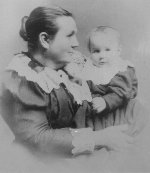
Amanda & Olive Tanner
While the men were haying, I carried water for them from the spring that my father dug out of the hill when I was about nine years old. I also used to lead the derrick horse that pulled the fork loads of hay upon the stack.
My brother Ralph was seven years older than I and my brother Valison five years older. Because of the difference in my age and Ralph and Val they never wanted me following them around while they were playing unless I could be of use to turn a play machine or help in the work. I was always delighted when my sisters came to visit and stay a few days as they each had a daughter a little older than I.
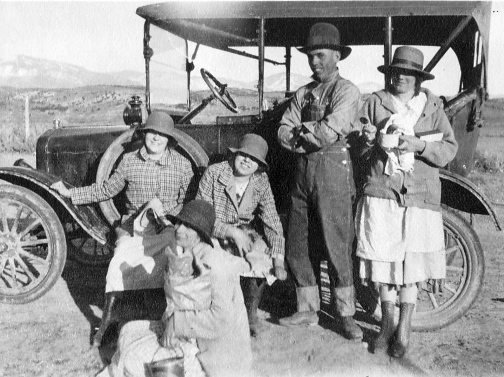
Olive Tanner, Mildred Barlow, Uknown, Alvin Kimber & Alice Barlow
I was lucky to have two older sisters that were almost like mothers to me. I used to stay with Emily at Grouse Creek for a week at a time. Her daughter Amanda was ten months older than I. Alice’s daughter was Myrtle and we were close until their deaths. Alice, over the years, made my clothes for me. She lived in Ogden but came out every summer and visited us for a few weeks. I looked forward to these visits.
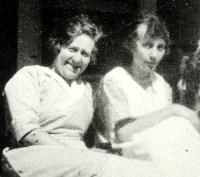
Emma Barlow – Olive Tanner
Our home was a five-room log house with a dirt roof. My mother was a good housekeeper so it was always clean and my father was ambitious and a good provider so we always had the necessities of life. I spent lots of time following my father around as he did his work. One of the clearest and fondest memories is that of seeing my father coming down through the meadow, after irrigating, with a shovel over his shoulder and many times I ran to meet him. Sometimes he would pick me up and carry me home.
I recall the balm of Gilead and poplar trees that furnished lovely shade and kept the house cool in summer, and the wood stoves in three of the rooms that furnished heat and comfort in the winter months. As my eyes move about the room, I can see the new rag carpet that covered half of the kitchen floor and represented many tedious hours my mother spent sewing rags and of the time I spent in clipping the threads and rolling the rags into balls which were then taken to be woven into yards of carpet.
A stream of water always flowed past the house and there was also a garden and a rock lined cellar where many bottles of fruit and other supplies of food were stored.
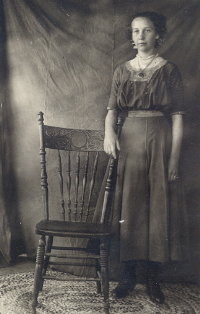 The bedroom I was born in was used later as a bedroom for the school teachers, which mother boarded each year to help make a living for the family.
The bedroom I was born in was used later as a bedroom for the school teachers, which mother boarded each year to help make a living for the family.
During the summer and fall months the Indians used to camp up above our meadow. We used to buy pine nuts from them. We always invited them to stay there and Captain Jim said mother was his friend. The Indians must have been camping there for years, as we used to find lots of arrow heads up in the sand hollow above our corral.
At one time an old guy who was a clock mender came. He sat by the window mending the clock and when he took his hat off he had head lice and mother about went crazy. She was afraid they would be all over the house.
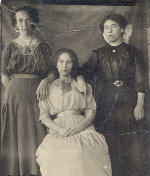
Olive Tanner, Amanda Tanner, and Clara Kimber
Moses Lavine and his father, used to make two or three trips a year to these outlying areas with clothing for sale. They used to stay at our home because mother never cooked food in lard or bacon grease. It was quite exciting to watch them bring in the big bundles and open them on the living room floor to show us what they had. They sold men’s and women’s clothing, shoes, overshoes, cloth and other things. In later years after I was married, Elmer Baker was our peddler and supplied us with most of our fruit, bringing it from the Brigham City area. we appreciated the peddlers that came in those days because we didn’t do our trading in town as we do today.
As a young child we went to Grouse Creek for church. We attended Sunday School at Etna. My parents were Latter-Day-Saints and believed in being honest and keeping the commandments, so I was taught to be honest and live as the church recommended. I always attended Sunday School and Sacrament meeting and also Primary, which was held after school at the school house.
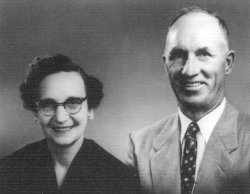
Olive & Winfred Kimber
On November 13, 1906 my father died as a result of an accident. This was a great loss to me as I spent many hours each day with him. I sat on his lap in the evenings before bedtime while he sang to me. Then we would both sit and sleep. I missed many months of school the year father died. Many months were spent traveling from one uncle or aunt’s house to another as mother was very nervous and ill and
could not stay home.
Mother taught me in my early years to sew, crochet, and do embroidery work. Many hours were spent doing this and I still have some of the articles I made. My mother churned butter and sold it with eggs and cream to the neighbors to help out with family expenses.
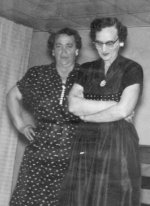
Amanda Paskett and Olive Kimber
When I lived on the ranch I used to ride horseback quite a bit. I would go for the mail and occasionally ride to Grouse Creek.
I visited a lot at the Lucas place. They had the post office for several years. Maude and Emma were two of my best friends. They visited a lot at our home. Maude and Val played music and we all sang. We also played cards. Val and Miss Hawkins also played and sang. I took a few lessons from Amy Warburton on Brazees organ. Sid Paskett and Val were great friends and Sid spent most of his time at our home.
My schooling commenced at Etna in September 1904. Due to delicate health and having to walk a mile to school my mother kept me home until I was almost eight years old. This did not affect me much as I passed two grades the first year. My first teacher was Mabel Warburton, one of our neighbor girls.
The first year I was in school I was on the program at a children’s dance. Mabel Warburton had me read a short story or something to show how well I could read. I can remember how timid I felt. This was the first time I ever performed in public. The school was a one room rock building where all grades, beginners to eighth grade, were taught by one teacher. Many happy days were spent here through the years I attended.
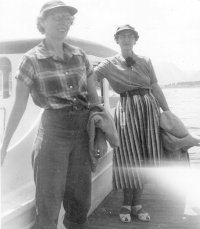
Delma & Olive Kimber
At recess and noon hour we used to walk a narrow board fence every day and played various games such as baseball, anti over the school house, tag, ran races, hide and seek in the high sage brush, hunt for sego roots and also had dances on the board platform porch. We must have looked quite funny. I remember our harmonica musician, May Douglas, laughing so hard she could not play at times. It was really fun and I think it was where I really learned to dance.
During winter months the boys would skate on the Lucas meadow which was in front of the school house. They brought hand sleighs too and the girls would ride and the boys pull them on the sleighs. When it was too stormy to play out of doors Jennie Douglas Richins and I read books together, sitting in the same desk. I can’t remember how many times we read Grimm Fairy Tales, Tom and the Water Babies and many others. We also played
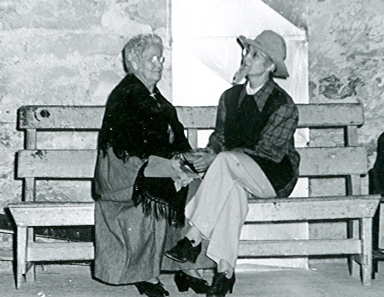
Ellen Toyn as Miranda & Olive Kimber as Silas in a play.
games on the blackboard.
When I was in the fifth or sixth grade I had a teacher at Etna that took a disliking to me so mother sent me over to stay with my sister Emily and I went to school at Grouse Creek.
After I moved to Grouse Creek, a ninth grade was added to the school and I and several others who had been out of school for some time took this grade. I was sixteen years old. I enjoyed that year very much. Lloyd G. Beech was the teacher.
I took extension work at Logan one year. Mother rented a house from Isaac Jorgenson’s sister. Mildred and Alice Barlow, Leslie Tanner and Hilda Betteridge all stayed with her. We lived down in town and had to walk up the hill to school. It was quite a climb each morning.
I further educated myself by reading. I like mystery stories and good novels and church books. I never desired to read lewd literature. I belonged to the LDS church Book of the Month Club for several years and filled all my book shelves with good books. I also subscribed to the Readers Digest Book of the Month Club.

Amanda Paskett and Olive Kimber
Once Joe Barlow came to me and said, “Why don’t you set your cap for Winfred Kimber because he’s sure a nice guy.” Joe had been working with him somewhere. So after that I began to notice him. Once a bunch of us kids were playing around at the church. I had a feeling he was going to ask me to come home with him and he did. From then on we started paying attention to each other. His dad owned a Model T Ford and that’s what we traveled in.
On November 8, 1922, Winfred Charles Kimber and I were married in the Salt Lake Temple. We took the train to get married. The ride to Lucin was very, very rough. While in Salt Lake, we stayed at the Raymond hotel. We also took the opportunity to have our teeth fixed while in the city.
About two years after we were married, Winfred applied for a homestead. We built a one room cabin of railroad ties on this land and this is where we lived for three years. There was a cedar tree by the cabin with a swing in it for Dorothy.
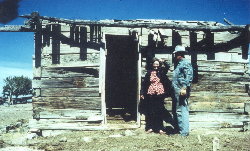
Homestead Cabin
Our homestead cabin was just outside the fence by the Morgan place and we used the corrals there. One summer I raised a nice lot of young chickens. At choke cherry time we went over to Val’s and went to Morris’ camp where we stayed all night. We got a nice lot of berries and came home. When we got home we discovered something had been killing our chickens so we looked around and found a badger hole dug at the back of the coop. We knew he would make his appearance again that night so we lit the lantern, loaded the gun and set down to wait. About dark the chickens began to squawk and we rushed down there and Mr. Badger had already killed five more and was surely busy. He tried to get thorough the hole he had dug but I had the lantern and Winfred shot him. He killed about 40 chickens in all.
We used to ride horseback a lot. We would put Dorothy in between us and would come to Grouse Creek and spend quite a lot of time over at Aunt Annie’s and Uncle Elmer’s visiting.
One summer I cooked for hay men and lived in a sheep camp at the Rosebud ranch. Also, I cooked for hay men at the Shoe, between Grouse Creek and Oakley.
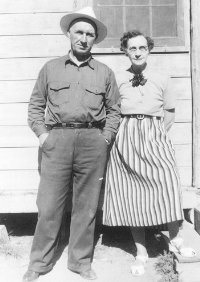
Winfred & Olive Kimber
My mother became ill and wanted us to come and live with her which we did but we surely regretted having to leave our first little home as we had been very happy there. We lived in the back part of mothers’ house and mother lived in the front two rooms. Dorothy and Delma managed to go into her rooms about every time she was eating because she used to feed them. She tended them many times while I went to Relief Society and other places. She loved the kids very much. My mother died on January 24, 1931. She had deeded her home and also ten head of heifers to us and we have lived here ever since.
My children are Dorothy Grace, born August 8, 1924, Delma Fay, born October 3, 1928, and Verna, born September 3, 1932. When Dorothy was born, I stayed at Grouse Creek. Mrs. Ellen Blanthorn and Mrs. Mary Hadfield were the midwives. I enjoyed making baby clothes for her and had special pride in sewing them. I would embroidery on her dresses and slips. When Delma was born, the midwives had stopped practicing so I went to Ogden for the birth. I went down at least a week early, and stayed with Myrtle Toyn. Mother took care of Dorothy while I was gone. When Verna was born, I stayed with Lindy and Billy Kimber in Ogden. I learned to love Lindy while I was there. She and Billy were so nice to me. Their son Eldred’s wife was about to be confined also and we used to walk together a lot in the evening time. I have always felt close to her since then.
Besides the sewing and crocheting I learned at Etna I continued to sew and made all of my children’s dresses while they were home and growing up.
I have also done a great lot of reading. I loved to play outdoor games particularly basketball and I loved to dance. When I was in my teens, we used to have a dance at Grouse Creek every week and sometimes two.
Winfred was away from home a lot with his work so I milked a cow and raised a garden. I also made my own quilts and embroidered many pairs of pillow cases.
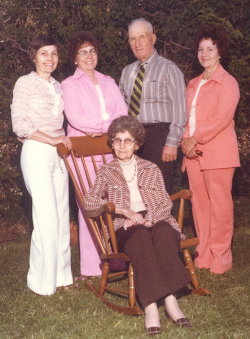
Verna Richardson, Delma Smith, Winfred Kimber, Dorothy Covieo & Olive Kimber
I have enjoyed doing genealogical work. I have spent many hours in the Salt Lake library. At one time Grouse Creek ward held a class in genealogy and the members would make trips to Burley to the genealogical library once a week, to attend a class. I surely enjoyed that class and the association of the other member who were taking it.
I have not traveled very much although I would have loved to have had the time and means to do so.
I was second counselor in the MIA. I held this position for three or four years. I was made Relief Society Literature Teacher. I did not keep this position very long. I was made Secretary of the Relief Society. I worked in this position for eighteen years.
We worked in harmony and had a lot of fun. We put on lots of programs on March 17. People came from all over to attend. After the program we would serve a dinner and in the evening have a dance. Ella Tanner was president, Martha Kimber and Rhea Toyn were counselors.
In June 1943 I was appointed an acting postmaster of Grouse Creek and postmaster on January 1, 1945. This was a work I have greatly enjoyed. I retired on November 22, 1966.
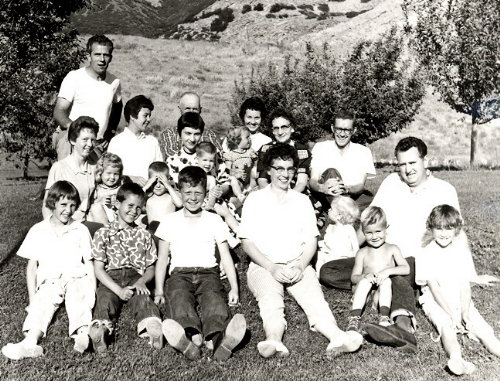
Winfred Kimber Family
Front Row: Susan Smith, Kim Covieo, Wynn Covieo, Delma Smith, Becky Smith, Alan Smith, Verl Smith, Karma Smith
Middle Row: Lana Covieo, Annette Covieo, Clark Richardson, Verna Richardson, Bruce Richardson, Olive Kimber, Val Richardson
Back Row: Al Covieo, Linda Covieo, Winfred Kimber, Dorothy Covieo , Alene Covieo
I had one catastrophe about 1960. A fire was started by a faulty extension cord in the back room of the post office. No post office equipment or records were destroyed but it took several months to re-line the building and paint it so it was in good order again.
I have had some trials and troubles but have always tried to meet them with an open mind and I know that through faith and prayer and works I have been able to overcome most obstacles put in my way. Although I have had to work quite hard, I have been blessed with good health during my life and have been blessed in many ways. I am proud of my daughters and their husbands and my grandchildren and great grandchildren and I love every one of them very much. I always pray for their happiness and protection.
I am thankful for ancestors who suffered many hardships to come to America and for my good husband and my home and friends. As this history ends, I am still enjoying good health and the blessing of being a member of the Church of Jesus Christ of Latter-day Saints which I know to be the only true church on earth and I pray I may always stay strong in my belief and live as I know God would have me live. I hope and pray my descendants may always stay true to this church.
Olive died on October 14, 1981 at her home. She was buried in the Grouse Creek cemetery.
